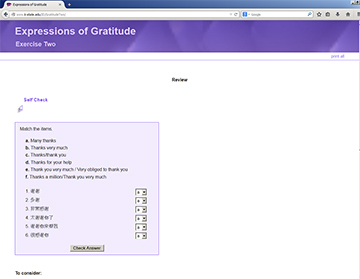Unit 2: Direct Thanking Strategies
Unit 2 explicitly teaches students the repertoire of direct thanking strategies in Chinese, and provides them with corresponding exercises and activities to practice.
2.1 Goal of Unit 2
The goal of Unit 2 is to familiarize students with the use of direct thanking strategies in Chinese, and ask students to analyze the differences between the use of direct thanking strategies in American English and in Chinese.
2.2 Direct vs. Indirect Thanking Strategies
Direct thanking strategies in American English refer to thanking expressions that contain such verbs as "thank" or "appreciate.” In other words, "thank" and "appreciate" explicitly convey the pragmatic function of showing thanks. Similarly, in Chinese, the verbs that explicitly indicate the function of expressing gratitude are 谢谢 (xièxiè, thanks), 感谢 (gǎnxiè, appreciate) or 多谢 (duōxiè, many thanks), to name a few.
Indirect thanking strategies, on the other hand, refer to the linguistic expressions that speakers use to express gratitude indirectly, i.e., not using the verbs that explicitly indicate appreciation. For example, speakers can choose to express their thanks by complimenting other people's work or efforts, which is a type of indirect thanking strategies commonly used in both American English and Chinese.
Thinking: Can you think of other indirect thanking strategies that are commonly used in American English in addition to the way of complimenting? Make a list of them.
2.3 Direct Thanking Strategies in English
In American English, the most commonly used direct thanking strategy is "thank you" or "thanks." These two expressions not only indicate the function of expressing gratitude explicitly, but can also perform other pragmatic functions, such as responding to compliments, or signaling the end of a conversation (Eisenstein & Bodman, 1986). In addition, speakers can modify these two expressions by adding different adverbs to show their differing degrees of gratitude. Some examples of the modified thanking expressions are "Thanks a lot/very much or thank you so much/very much."
Direct thanking strategies in American English also include the verb "appreciate," such as "I appreciate your help" and "I really appreciate it."
Thinking: Are there other direct thanking strategies in American English?
2.4 Direct Thanking Strategies in Chinese
In Chinese, direct thanking strategies are linguistic expressions that contain such verbs as 谢谢 (xièxiè) /感谢 (gǎnxiè) /多谢 (duōxiè) /感激 (gǎn jī). These verbs can be followed by nouns, pronouns, or clauses to refer to the person toward whom the gratitude is directed or the act based on which the appreciation is given. For example,
谢谢老师!xièxie lǎoshī (Thanking verb + Noun)
谢谢你!xièxienǐ (Thanking verb + Pronoun)
多谢你来帮我!duōxiè nǐ lái bāng wǒ (Thanking verb + Clause)
Chinese speakers often use words to modify these thanking verbs to express their differing degrees of gratitude. Some examples of these modifiers are 很 (hěn) /非常 (fēicháng) /太 (tài), and corresponding thanking expressions can be 很感谢你 (hěn gǎnxiè nǐ) / 非常感谢 (fēicháng gǎnxiè) /太谢谢了 (tài xièxiè le) (all can be translated as “thank you/thanks very much” in English), to name a few.
In addition, the verbs 谢谢 /感谢 /多谢 can be duplicated to intensify the force of appreciation, such as 谢谢! 谢谢 / 感谢! 感谢 /多谢! 多谢, which are often used in everyday conversation.
Thinking: What direct thanking strategies in Chinese have you heard or used in addition to the given examples?
To learn more about the Chinese thanking expressions in this section, please refer to the Glossary below.
| Word | Pinyin | Part of speech | English translations |
| 谢谢 | xièxiè | verb | Thanks; thank you |
| 感谢 | gǎnxiè | verb | To thank; to appreciate |
| 多谢 | duōxiè | verb | Many thanks |
| 感激 | gǎn jī | verb | To appreciate |
| 老师 | lǎoshī | noun | Teacher; professor |
| 你 | nǐ | pronoun | You |
| 来 | lái | verb | Come over |
| 帮 | bāng | verb | To help; to assist |
| 很 | hěn | adverb | Very; quite |
| 非常 | fēicháng | adverb | Very; unusually |
| 太 | tài | adverb | Very; extremely |
Please use the Review link to apply the lessons above.
